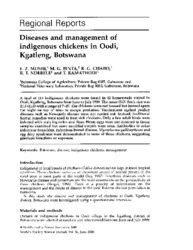| dc.contributor.author | Mushi, E.Z | |
| dc.contributor.author | Binta, M. G. | |
| dc.contributor.author | Chabo, R.G. | |
| dc.contributor.author | Ndebele, R.T. | |
| dc.contributor.author | Ramathodi, T. | |
| dc.date.accessioned | 2022-05-05T08:12:38Z | |
| dc.date.available | 2022-05-05T08:12:38Z | |
| dc.date.issued | 2007-09-18 | |
| dc.identifier.citation | Mushi, E., Binta, M., Chabo, R., Ndebele, R., & Ramathodi, T. (2000). Diseases and management of indigenous chickens in Oodi, Kgatleng, Botswana. World's Poultry Science Journal, 56(2), 153-157. doi:10.1079/WPS20000012 | en_US |
| dc.identifier.uri | https://doi.org/10.1079/WPS20000012 | |
| dc.identifier.uri | https://hdl.handle.net/13049/438 | |
| dc.description.abstract | A total of 215 indigenous chickens were found in 10 homesteads visited in Oodi, Kgatleng, Botswana from June to July 1999. The mean (SD) flock size was 21.5 (11.6) with a range of 7–47. The chickens were not housed but instead spent the night on top of trees to escape predation. Vaccinations against poultry diseases such as Newcastle disease were not carried out. Instead, traditional herbal remedies were used to treat sick chickens. Only a few adult birds were infested with scaly leg mites and fleas. Worm eggs were not detected in faecal samples examined but some coccidial oocysts were seen. Antibodies to avian infectious bronchitis, infectious bursa1 disease, Mycoplasma gallisepticum and egg drop syndrome were demonstrated in some of these chickens, suggesting previous infections or exposure. | en_US |
| dc.language.iso | en | en_US |
| dc.publisher | Cambridge University Press | en_US |
| dc.relation.ispartofseries | World's Poultry Science Journal;56(2), 153-157. doi:10.1079/WPS20000012 | |
| dc.subject | Botswana | en_US |
| dc.subject | Disease | en_US |
| dc.subject | Indigenous chickens | en_US |
| dc.subject | Management | en_US |
| dc.title | Diseases and management of indigenous chickens in Oodi, Kgatleng, Botswana. | en_US |
| dc.type | Article | en_US |

